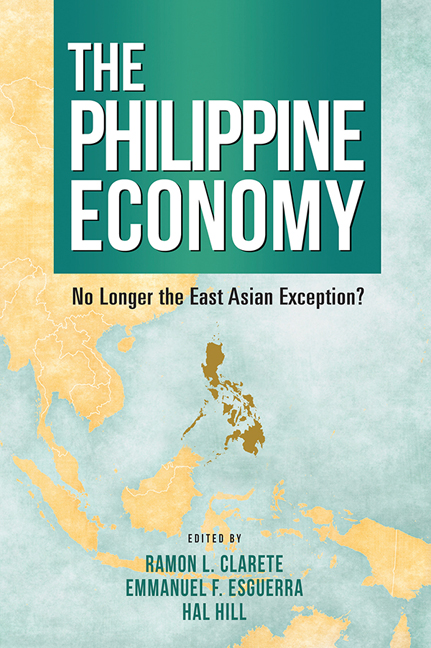Book contents
- Frontmatter
- Contents
- List of Figures
- List of Tables
- Foreword by Arsenio M. Balisacan
- Preface
- About the Contributors
- 1 The Philippine Economy: An Overview
- 2 Economic Growth and Poverty Reduction
- 3 Infrastructure and Urbanization
- 4 Education and Training
- 5 Universal Health Coverage, Health Security and Resilient Health Systems
- 6 Environmental Resources, Shocks and National Well-Being
- 7 Energy: Power Security and Competitiveness
- 8 Development Finance
- 9 Governance and Institutions
- Index
5 - Universal Health Coverage, Health Security and Resilient Health Systems
Published online by Cambridge University Press: 12 February 2019
- Frontmatter
- Contents
- List of Figures
- List of Tables
- Foreword by Arsenio M. Balisacan
- Preface
- About the Contributors
- 1 The Philippine Economy: An Overview
- 2 Economic Growth and Poverty Reduction
- 3 Infrastructure and Urbanization
- 4 Education and Training
- 5 Universal Health Coverage, Health Security and Resilient Health Systems
- 6 Environmental Resources, Shocks and National Well-Being
- 7 Energy: Power Security and Competitiveness
- 8 Development Finance
- 9 Governance and Institutions
- Index
Summary
No one wants to be sick. Yet, those who fall ill are punished with the high cost of accessing healthcare. While one cannot totally prevent it, conditions where an individual is born, grows, works, lives and ages contribute to the likelihood of falling ill. For example, population groups residing near development projects are unnecessarily exposed to hazards, thus increasing their vulnerability. Residents of disasterprone areas cannot rely on their health system in the aftermath of a shock, even after a few years, for them to live the way they used to.
This chapter argues why the government should sustain its ongoing investments in health, and proposes where and how these investments should be channelled in order to ensure that (1) the system is designed as one which promotes health or makes it easy for people to choose the healthier option; (2) those who fall sick are not driven to impoverishment; and (3) the system remains dependable in the event of shocks/disasters.
Box 5.1. A Typical Case of a Filipino Family in 2016 Jose and Alicia, are minimum wage earners. They live in Cavite but work in a factory in Mandaluyong City, Metro Manila. Commuting to work means losing four hours daily to travel. Because they are home late and have to leave early the next day, they are unable to prepare lunch. They are suki (frequent patrons) to Aling Nene's ration consisting of one-fourth serving of viand and three-fourth serving of rice — food with little nutritional value and that is often salty. At work they are exposed to high heat, with the factory having little ventilation.
One day Jose had a bad case of diarrhoea requiring admission. They chose to go to the nearest government hospital. Since Jose, a PhilHealth insurance member, was confined in the “charity ward”, where one nurse takes care of eighteen patients simultaneously, Alicia had to stay as a watcher to make sure all of Jose's needs were being met. Moreover, the attending physician tasked Alicia to purchase medicines in a drug outlet a few kilometres away, as the hospital pharmacy had run out of stock.
After three days in the hospital, both Jose and Alicia had lost three days of work and had spent most of their savings. Jose will also need to start allocating a portion of his salary for maintenance medications.
- Type
- Chapter
- Information
- The Philippine EconomyNo Longer The East Asian Exception?, pp. 190 - 230Publisher: ISEAS–Yusof Ishak InstitutePrint publication year: 2018



